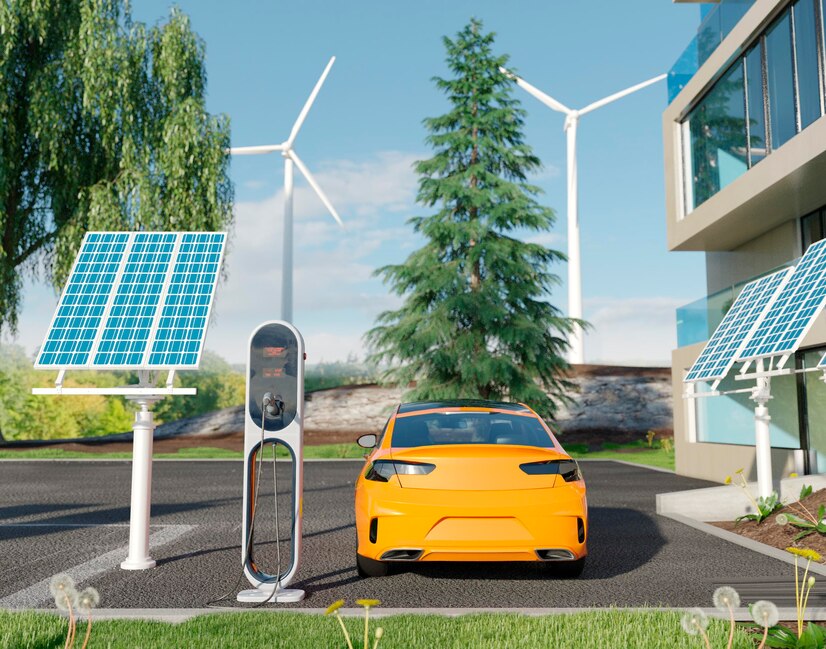
Exploring the Economic Benefits of Electric Vehicles (EVs)
Exploring the economic benefits of electric vehicles (EVs) reveals a transformative shift in the automotive industry, bringing about substantial advantages compared to conventional cars.
Electric car contributes significantly to economic growth through various channels, including lower fuel costs and reduced maintenance expenses.
Unlike their traditional vehicles, an electric vehicle boasts lower fuel costs as they rely on electricity, which is often more economical and stable in pricing.
Moreover, the low maintenance costs associated with electric vehicles further enhance the economic benefits, as they typically have fewer moving parts and require less frequent servicing.
This benefits individual consumers and has broader implications for businesses and governments seeking sustainable economic development.
Additionally, the environmental benefits of electric vehicles, such as reduced air pollution and greenhouse gas emissions, contribute to long-term economic sustainability.
Governments often incentivize the adoption of EVs through tax benefits, creating a positive feedback loop that supports both environmental and economic goals.
As the automotive landscape evolves, recognizing the multifaceted economic benefits of electric vehicles becomes crucial for fostering a greener, more sustainable, and economically robust future.
What are the economic and financial benefits of electric vehicles?
The widespread electric vehicle adoption in the Philippines brings about various economic and financial benefits. A notable advantage is the reduced maintenance costs associated with electric vehicles compared to conventional vehicles, owing to the more straightforward mechanics and fewer components.
This shift towards electric vehicles aligns with the country’s commitment to harnessing renewable energy sources for its electric grid, contributing to a greener and more sustainable transportation sector. The consequential decrease in carbon dioxide emissions from electric vehicles is crucial in minimizing the overall carbon footprint.
Beyond environmental gains, the economic benefits are evident, with the total cost of ownership for electric vehicles proving competitive, especially when factoring in potential government incentives.
Given the volatility of gasoline prices, the stability of electricity rates further enhances the economic appeal of electric vehicles, providing a reliable and cost-effective alternative with zero tailpipe emissions.
As the nation actively pursues cleaner and more efficient transportation solutions, the widespread adoption of electric vehicles translates into individual savings and fosters a more resilient and sustainable national economy.
Electric Vehicles in the Philippines
The Public Utility Vehicle (PUV) Modernization Program
The implementation of an extensive transportation initiative by the Department of Transportation (DOTr) called the Public Utility Vehicle (PUV) Modernization Program. This program aims to retire jeepneys (converted World War II-era jeeps for public transport) at least 15 years old and replace them with eco-friendly alternatives, including vehicles compliant with Euro-4 standards or electric vehicles (EVs).
With nearly 180,000 jeepneys operating nationwide requiring modernization, the EV industry aims to meet 10% of this potential demand, promoting electric vehicles and electric power adoption.
Lower maintenance costs associated with driving electric vehicles are a vital consideration for EV adoption, and efforts are being made to enhance the EV charging infrastructure to support current and future EV owners. Initiated in 2017, the PUV Modernization Program is in transition until June 2020.
However, recent data indicates that approximately 18,000 jeepneys have undergone modernization, highlighting the need for increased awareness and initiatives for the overall benefits of driving electric vehicles. Nevertheless, the government has affirmed its commitment to continue implementing the program beyond the transition phase.
Electric power consumption of electric vehicles
Sustainable Transportation Options
Electric power consumption of electric vehicles in the Philippines is gaining attention as the nation explores sustainable transportation options. Unlike the internal combustion vehicle relying on fossil fuels like gasoline, diesel oil, liquefied petroleum gas, and compressed natural gas, electric vehicles utilize electric motors powered by batteries.
The electric power needed for these vehicles poses challenges and opportunities for the local electric utilities and the overall electric grid infrastructure, with a critical consideration being the battery life of these vehicles.
Optimizing Power Usage
However, integrating regenerative braking technology in electric vehicles helps optimize power usage, capturing and storing energy during braking to enhance efficiency. As the Philippines looks to embrace renewable energy sources, the transition to electric vehicles aligns with the goal of reducing dependence on traditional fuel sources, such as diesel cars.
While initial concerns may include the impact on electric grids and fuel costs, the long-term benefits of adopting electric cars, including lower operational expenses and reduced environmental impact, are driving the country towards a more sustainable and eco-friendly future.
Contribution of electric vehicles on transportation sector

The introduction of electric vehicles in the Philippines’ transportation sector has made significant contributions towards sustainable and efficient mobility. Electric vehicles offer substantial fuel savings compared to traditional diesel cars, as they rely on electricity rather than diesel fuel for power.
This reduces dependence on traditional energy sources like diesel and contributes to lower fuel costs for both individual consumers and businesses. The shift towards electric vehicles aligns with eco-friendly practices, promoting a cleaner and greener environment.
The adoption of electric vehicles is essential in reducing carbon emissions, supporting the country’s commitment to environmental conservation. Beyond individual benefits, the integration of electric vehicles fosters industrial development, encouraging the growth of a sustainable and efficient transportation ecosystem.
As the Philippines continues to embrace the efficient and eco-friendly attributes of electric vehicles, it positions itself at the forefront of modern transportation solutions, setting the stage for a more sustainable future.
Types of Electric Vehicles
There are several sorts of electric vehicles that cater to different needs and preferences.
Battery Electric Vehicles (BEVs)
Fully electric, with no internal combustion engine, depending exclusively on electric power stored in batteries for propulsion.
Plug-in Hybrid Electric Vehicles (PHEVs)
A hybrid of an electric motor and an internal combustion engine can run on electricity alone or switch to conventional gasoline when needed.
Hybrid Electric Vehicles (HEVs)
It uses both an electric motor and an internal combustion engine but cannot be charged externally; instead, electric power is generated by regenerative braking.
Key Takeaways
Electric vehicles considerably contribute to local economy and economic growth, including cheaper maintenance and lower fuel costs. Electric cars, unlike their traditional counterparts, have reduced fuel expenses. They run on electricity, which is frequently more inexpensive and predictable in pricing.
Electric vehicle power usage garners attention in the Philippines as the country investigates sustainable transportation alternatives. Car makers and manufacturers are urged to consider ev purchases with incentives offered like tax credit, tax incentives, and others. Unlike internal combustion vehicles, which rely on fossil fuels such as gasoline, diesel oil, liquefied petroleum gas, and compressed natural gas, electric vehicles rely on batteries.
The widespread adoption of electric vehicles minimizes carbon emissions and supports the country’s commitment to environmental protection. Aside from personal benefits, the use of electric vehicles promotes industrial development by promoting the construction of a sustainable and efficient transportation ecosystem.

Celebrate Life’s Milestones in Camella!
Make unforgettable memories in a Camella home.
Our communities are designed to elevate your living experience.


